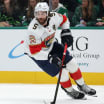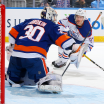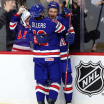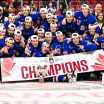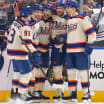Flames aiming to re-sign Gaudreau, Treliving says
Deal with pending free agent forward 'will take care of itself,' according to GM in Q&A with NHL.com
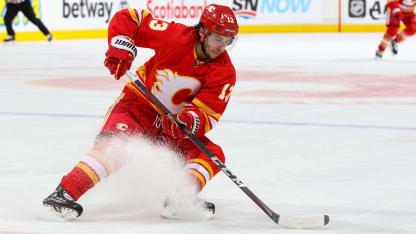
© Gerry Thomas/Getty Images
The 28-year-old forward is in the final season of a six-year contract he signed Oct. 10, 2016 and could become an unrestricted free agent July 13.
"It's the same thing we've said all year," Treliving said. "We're going to let that take care of itself behind closed doors. So it's been a non-issue.
"Johnny's a huge part of our team, drives our offense. We want to get him back. We want to sign him here long term but we've put all the focus on just worrying about playing the games here right now. We've stayed in touch with his representatives and we'll deal with that quietly and away from the spotlight."
Gaudreau scored a hat trick in Calgary's 4-1 win against the Tampa Bay Lighting on Thursday. The 28-year-old leads the Flames with 77 points (26 goals, 51 assists) in 57 games, an average of 1.35 points per game, and is ranked fourth in the NHL in scoring.
His career-best NHL season came in 2018-19, when he scored 99 points (36 goals, 63 assists) in 82 games, averaging 1.21 points per game.
Gaudreau also has bounced back sharply from last season, when he scored 49 points (19 goals, 30 assists) in 56 games. That turnaround is a big reason why the Flames (35-15-7) lead the Pacific Division.
Calgary has other significant players whose contracts will expire after this season, including forwards Matthew Tkachuk and Andrew Mangiapane and defenseman Nikita Zadorov. Tkachuk is second on the Flames with 66 points (27 goals, 39 assists) in 57 games and Mangiapane is fourth with 43 points (29 goals, 14 assists) in 57 games. Zadorov has scored 15 points (three goals, 12 assists) in 50 games. Tkachuk and Mangiapane each could become a restricted free agent July 13; Zadorov could become an unrestricted free agent.
Treliving said he didn't know if any of those contracts could be extended before the trade deadline.
"We've got a number of people that are going to require contracts," Treliving said. "We try to separate that from … if there are ways we can help our team beyond what we've done, we'll continue to look at it. The rest of that stuff, we'll deal with at the appropriate time and focus on what's ahead of us on the schedule and try to earn a (Stanley Cup) playoff spot."
Treliving discussed the trade deadline, the performance of forward Tyler Toffoli and coach Darryl Sutter in an interview with NHL.com.
You acquired Tyler Toffoli from the Montreal Canadiens (for forwards Tyler Pitlick, Emil Heineman, a first-round pick in the 2022 NHL Draft and a fifth-round pick in the 2023 NHL Draft on Feb. 14) well in advance of the deadline. What was the thinking there?
"It's a need we've had for a while. We've been short a right-shot winger for a long time. I felt the team was in a place where I wanted to help. He's a player we've liked for a while. I talked to Jeff (Gorton, Montreal executive vice-president of hockey operations) when he first went into Montreal, the season they were having and some of the things they may be thinking, and we talked about Tyler being an option, and when Kent (Hughes, new GM) [was hired], we really started to push. When we made the trade, we had 17 games before the deadline and looked at it as 34 points available. We wouldn't have made a deal like this if he didn't have term remaining on his contract (two more years) and ultimately it was the fit. He knew our coach, played with several players on our team but from an transition standpoint, I thought it would be an easy transition for him. Plus I'm not a big fan of the deadline so if we were going to do something, I'd rather do it ahead of time when you're sure to be out of a traffic jam."
What's Toffoli's impact been?
"It's gone as we hoped it would. He's got 12 points (seven goals, five assists) in 12 games. There's always uneasiness going to a new team but it was instantaneous for him. It's not like he's wondering what the coach is all about (Toffoli played under Sutter for five seasons with the Los Angeles Kings). He knew what to expect. It was like jumping back on a bike for both of them. The coach knew exactly what to expect, too, and he felt comfortable with his teammates. He has fit our positional need and come in and given our power play a boost. It's been as seamless as it could be thus far."
What's your assessment of the activity and the chatter leading up to the deadline?
"I would call it normal. Kind of quiet recently. Everybody's done their calls to see where everybody's at. You've got some people that want to buy, some that are sellers and you've got a group of teams that are waiting. Over the course of the next week to 10 days, depending on how games go, it may push people into one camp or the other. You have a pretty good idea of what's out there, what could be had and what the prices are likely to be and I think this is the time where it settles and you've got teams that are waiting and the dynamic of the deadline has changed in recent years. There's always activity but it's more now that everybody that's in the playoffs is up at or near the cap so everybody needs the time to accrue as much [space] as they can accrue. I think it's normal and the calm right now but it'll pick up as it normally does."
Johnny Gaudreau's not the only player that's had a bounceback season. What's behind that and how have the Flames gone from missing to the playoffs last season to being in first place in the Pacific Division this season?
"Good question. Darryl's had a huge impact on our team. We've brought in some people around the edges that have made an impact, people that have won … so those are contributing factors. We have good players. We've had good players. I've believed in this group. It's why we haven't … a lot of people were standing on the rooftops shouting for change. I just didn't believe it. And I really do think the last 18 months have been a weird time. Nobody really wants to hear it and it's not really an excuse for having an underperforming year last year, but it was a bizarre time and affected everybody a little differently. It had an impact on our team. No excuse, but we really felt it. We needed to change some things around but at the end of the day, we felt we had good players that had down years. It's hard to replace good players, hard to get value for players that underperformed. Change for the sake of change has never made any sense to me, so we focused on how to get our good players back to being good players."
What's Darryl Sutter's impact in all of that?
"Darryl's brought structure, accountability. He deserves a lot of credit. In this area, he's one of the great coaches of our game. His fingerprints are all over the team's success to this point. And the team has really bought into his message. I said when I hired him that I believe this team needs what Darryl brings. And I've known Darryl a long time and I think the public perception of him as opposed to the reality is different. He's real clear with players. No gray area. He's put people in specific roles. He's given real structure to our team and then there's been a great deal of accountability. Those are his strengths. Real clear in team play. He's had a real big impact. Until you know Darryl, well, he's as innovative and up to date on the modern game as any coach."
The COVID-19 wave that hit your team suddenly and nearly all at once before Christmas could not have been an easy time. How did you get through it and back on track so well?
"We didn't come out so well. It hit, kind of startling how quickly, and I think up to 54 cases with players, staff, families. It was shocking and we were off almost three weeks (Dec. 12-29). We went to Seattle (a 6-4 win at the Kraken on Dec. 30) and then Chicago (a 5-1 win at the Blackhawks on Jan. 2) and we won those games but didn't look like ourselves. Then we did a trip through Florida (a 6-2 loss at the Panthers on Jan. 4), Tampa Bay (a 4-1 loss at the Lightning on Jan. 6) and Carolina (a 6-3 loss at the Hurricanes on Jan. 7) and lost all three. Nobody said anything but we just didn't look like us. So I do think there was an impact but we didn't have the same energy, same pop that we had before. Then we got some of that back (18-5-1 since Jan. 13) but it was two to three weeks of just grinding through when we came back. It took a bite out of us."
